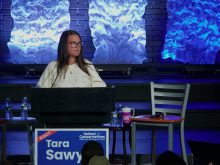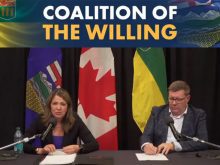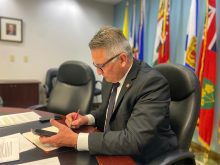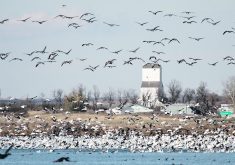Saskatchewan Party leadership candidates tackled agricultural issues January 4 at a forum organized by agricultural organizations.
Farmers in the crowd said it was important to hear the leadership candidates, especially because the winner will eventually become premier once Brad Wall steps down.
The candidates, Tina Beaudry-Mellor, Ken Cheveldayoff, Alanna Koch, Scott Moe and Gordon Wyant, answered questions they were given in advance, blind questions and a few written questions from the floor.
The vote is planned for Jan. 27 in Saskatoon. However, many party members may have already sent in their preferential ballots.
Read Also

Farming Smarter receives financial boost from Alberta government for potato research
Farming Smarter near Lethbridge got a boost to its research equipment, thanks to the Alberta government’s increase in funding for research associations.
Water management, including the flooded Quill Lakes, prompted several questions.
One noted funding for conservation area authorities was cut from $900,000 per year to zero, along with an estimated cost of repair and upgrade to existing management systems of more than $300 million. The Saskatchewan Conservation and Development Association asked what level of financial support the new premier would commit.
The candidates agreed that water issues were raised throughout the province and at almost every meeting.
Moe, who was environment minister before entering the race, said he would look at opportunities for more federal funding to offset maintenance and construction.
“There is an opportunity for us to move water in a controlled, in an organized, fashion and in a responsible fashion that benefits not only the ag producer but those downstream,” he said.
Koch also said further federal investment is an option and that multi-year planning is required, while Cheveldayoff suggested a new program to fund proper technical studies of new or redesigned projects.
Wyant said he couldn’t commit a specific amount until he fully understood the demand for water infrastructure and discussed the issue with producers and the federal government.
“We need to look to see how we can lever private capital with respect to helping with some of these issues,” he said. “Unless we get a handle on the deficit that we have in terms of the infrastructure deficit with this project we’re not going to be able to move this forward.”
Beaudry-Mellor said the passage last fall of Bill 44 means the province will move forward with its agricultural water management strategy and that is an opportunity to set better policy.
“We’ve taken a very reactive rather than proactive approach,” she said.
She also agreed that water issues have been heard repeatedly throughout the campaign.
“No matter who gets elected as leader of the Saskatchewan Party, I think you can rest assured that water is something that will be high on the agenda,” she said.
Other issues that came up included road funding, value-added opportunities, carbon tax, rural crime and business risk management programs.
All agreed AgriStability must be improved but not necessarily scrapped. Koch noted it was originally a stabilization program.
“Now it’s essentially a disaster program,” she said.
It is still paying out millions of dollars, she said, and for that reason it wouldn’t be practical to eliminate it.
Wyant and Moe both said producers tell them only their accountants benefit from the programs from the money they are paid for filling out the applications. They said further consultation is required.
Beaudry-Mellor also said she is in favour of simplifying AgriStability but not scrapping it.
Cheveldayoff said it could possibly be combined with crop insurance.
“Producers are voting with their feet,” he said. “It needs to be better.”
A recording of the 2.5-hour forum, which was broadcast live on Facebook, is available at saskfsa.com.
Contact karen.briere@producer.com


















